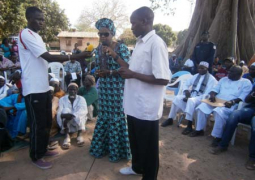The
The programme, held at the Alliance Franco Gambienne on
The forum, preceded by a match pass from the Pipeline Mosque to Alliance Franco Gambienne, was led by the scout band.
As part of the commemoration, organisers held a voluntary counselling and testing and also distributed 100,000 condoms.
In his opening remarks, Sutay Jawo, deputy director at the Ministry of Youth and Sports, said young people are the hope of the nation since they constitute more than half of the country’s population.
The youth need more encouragement and motivation, he said, adding: “We must give them the necessary skills and knowledge to protect themselves and others from diseases such as HIV and AIDS.”
This year’s theme ‘getting to zero’ should be the concern of everyone, particularly the young people.
He stressed that they must work and make sure they protect themselves and others from the spread of the HIV virus.
“We must continue to fight against discrimination and we should all make individual pledges not to ever discriminate a person living with HIV and AIDS,” said Sutay.
The Youth and Sports ministry representative at the forum said they would make sure there is increased awareness on issues relating to HIV and AIDS and other STIs, especially among the youth.
The Government of The Gambia is vigorously championing partnerships across the entire spectrum in the fight against HIV and AIDS and related problems, he said.
In his statement at the forum, Professor Muhammed Kah, the Vice Chancellor of the
He says the HIV/ AIDS virus is very dangerous and intelligent and that there is a need to set ambitious targets in the fight to combat.
The good news is that the world understands it and that a lot have to be done, he said
“We have to play our part in fighting the virus,” Kah added, saying: “We have to abstain and go for voluntary counselling and testing and together we should do our best to fight against it.”
In his speech on Universal Access and National Response, Ousman Njie from the National Aids Secretariat (NAS), said global leaders have pledged to work towards universal access to HIV and AIDS treatment, prevention and care for people living with the virus.
Yet, he noted, a greater commitment is needed around the world if the goal of universal access is to be achieved.
According to him, millions of people continue to be infected with HIV every year and in low and middle income countries less than half of those in need of antiretroviral therapy are receiving it and “too many do not have access to adequate care services”.
The protection of human rights is fundamental to combating the global HIV and AIDS epidemic, he said
He further stated that world Aids Day provides an opportunity for all individuals, communities, and political leaders to take action and ensure that human rights are protected and global targets for HIV /AIDS prevention and treatment are met.
Mr Njie further said that in The Gambia despite the moderately high level of awareness about HIV/AIDS new infections continue to rise among the youths indicating that knowledge does not translate into action or behaviour change.
He said the physical, psychological and social attributes of young people make them particularly vulnerable to HIV and other STIs.
In her speech, Maria Odeal of UNAIDS said that every person can make a difference in the fight against HIV/AIDS.
He called on the youth to play active role in fighting the virus, while urging them to go and have a test to also know their status.
Read Other Articles In Article (Archive)


